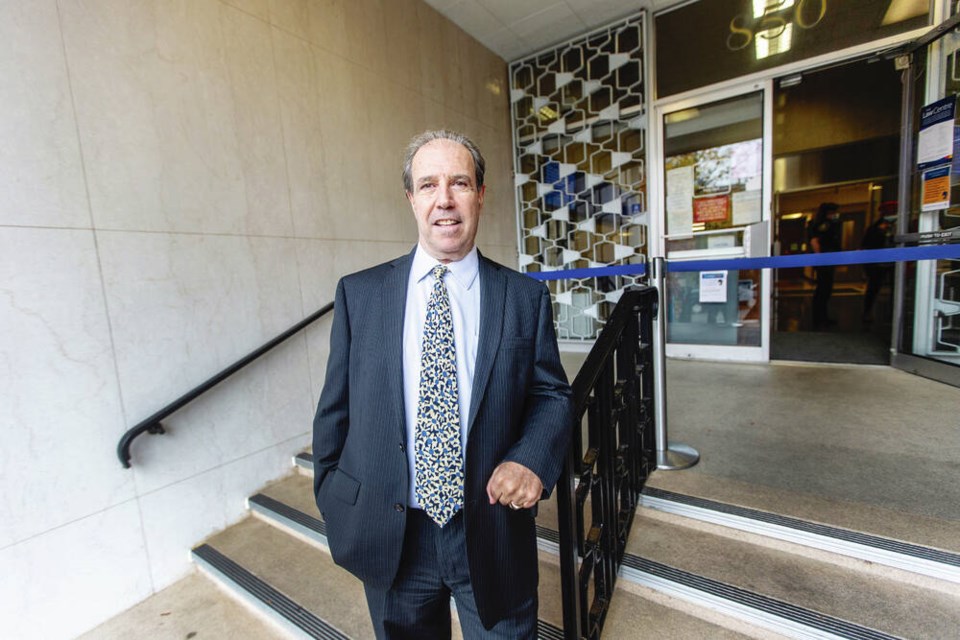The Victoria lawyer suing the Law Society of BC for defamation in relation to controversial Indigenous coursework has asked a judge to strike the society’s response to his claim.
Criminal defence lawyer James Heller described as a “lengthy prolix, convoluted and incomprehensible pleading,” in a June 2 application to B.C. Supreme Court.
Heller contends in his application the society’s response provides no “justification defence” of the underlying facts, as he sees them — that is, whether a law society press release defamed him.
“The tone and content of the [response to civil claim] is one of righteous indignation intended to demonstrate moral correctness rather than providing a concise statement of material fact,” stated Heller, adding in his adjoining affidavit that “upon reviewing the [response to civil claim], I was unable to comprehend the relevance to much of its contents.”
Heller has claimed the society republished false and defamatory statements made against him when he proposed changes to mandatory Indigenous training coursework last fall.
Last year, Heller said he observed what he describes as a factual inaccuracy in the coursework language — that there was definitively an unmarked burial site containing the bodies of 215 children on the former Kamloops Indian Residential School grounds.
Heller said that was not the case, and that the ground-penetrating radar discovery announced in May 2021 by Tk'emlúps te Secwépemc First Nation has only shown anomalies, which could potentially be bodies, or not.
Heller submitted a resolution to edit the language at the law society's September 2024 annual general meeting.
Thereafter, the BC First Nations Justice Council issued a statement calling Heller’s resolution racist and a denial of the Indigenous genocide. The society included the council’s statement in an online press release ahead of the meeting.
The press release stated: “The resolution submitted by Mr. Heller and Mr. Berry only highlights the need for the IIC and confirms much work remains to be done to increase knowledge and understanding, continue our efforts of advancing meaningful reconciliation with Indigenous people, and eliminate racism in our profession.”
The final vote saw 1,683 attending society members oppose the resolution and 1,499 vote in favour of it, with 590 abstaining.
Heller filed his lawsuit on Feb. 4 and in response the society stood by its mandatory Indigenous coursework, denying it contains inaccuracies about residential school burial grounds.
Heller claims the society is conducting itself on ideological grounds and has raised “irrelevant” matters from the Truth and Reconciliation Commission of 2015 and opinions of the Canadian Archaeological Association.
Heller also argues technicalities such as failing to produce a list of documents and failing to abide by pleadings rules by not providing a concise defence.
Subsequent to Heller’s application, the society responded on June 25, calling it a “transparent attempt to air his ideological grievances with the law society in the public arena.”
The society charges Heller’s application as similarly being “argumentative and inadmissible.”
The society then charges Heller’s application to strike its response as “draconian.”
The society notes it asserts the defence of “qualified privilege and responsible communication, to which the facts pleaded in the response relate.”
The society added: “Heller brought the resolution in a way that was improperly and inaccurately framed in circumstances in which he knew the issue was one of great tension and complexity and in which it could not reasonably be said to be urgent. Heller continued to advance the resolution and continued to express his personal views, despite being told repeatedly about the basic and obvious mistakes contained in both.”
For his part, Heller has expressed in filings concerns that the society is not operating the coursework based on facts.
Heller notes in his affidavit he had concerns that the coursework language could lead to abuse of judges as he contends happened when an Indigenous criminal defendant charged a trial judge with bias after qualifying the alleged unmarked graves as “potential” unmarked graves during the course of discussion in the courtroom.
The appeal application was brought forward on grounds the judge was biased. That was denied by a panel of three Court of Appeal judges, including Chief Justice Leonard Marchand, who is the first Indigenous person to hold that position.
“It is simply not possible to objectively interpret the judge’s comment about 'potential' remains at unmarked burial sites as indicative of apparent or actual intolerance, denial or bias,” Marchand ruled.
Heller’s claim suggests this is proof positive that his resolution to insert the word “potential” into the coursework is not racist, as it aligns with Justice Marchand’s own assessment.
A hearing on Heller’s application to strike is expected June 30.



